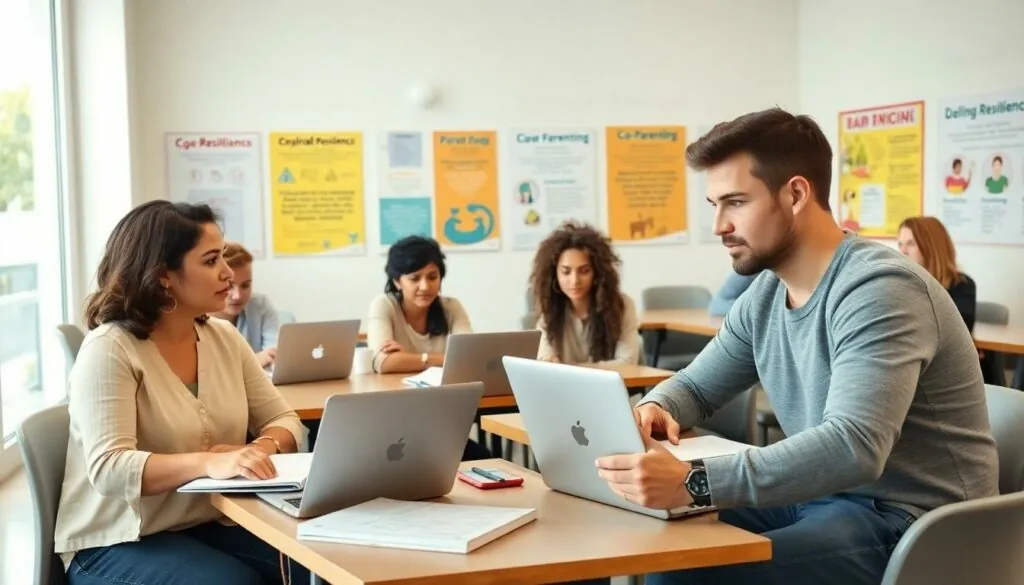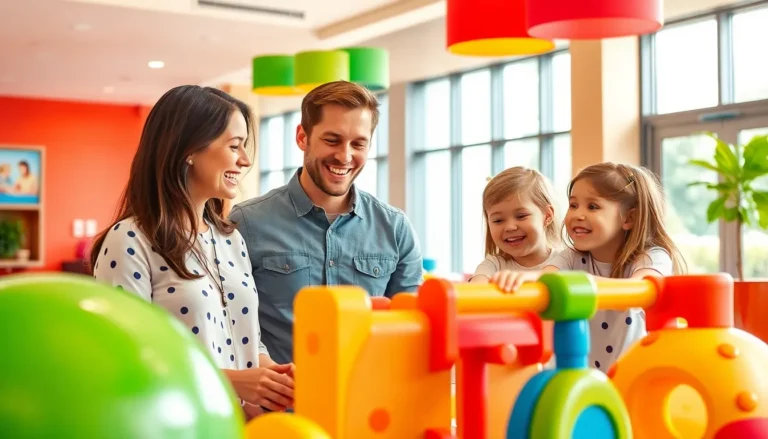Table of Contents
ToggleDivorce can feel like a rollercoaster ride—thrilling at times but mostly just a dizzying blur of emotions. For parents navigating this bumpy journey in Florida, finding the right support is crucial. Enter the Florida parenting class for divorce, a lifeline that not only helps parents learn the ropes but also keeps sanity intact.
Overview of Florida Parenting Classes
Florida parenting classes provide essential support for parents navigating divorce. These classes offer guidance on co-parenting strategies, communication skills, and emotional resilience. Many programs focus on the effects of divorce on children, ensuring parents understand their children’s needs during this transition.
Programs vary in length and format, ranging from one-time workshops to multi-week courses. Online and in-person options exist, catering to different preferences and schedules. The Florida Department of Children and Families approves many of these classes. This approval ensures compliance with state standards, reinforcing the validity of the information shared.
Participation in these classes often fulfills court requirements related to divorce proceedings. Parents seeking custody or visitation arrangements frequently find these classes beneficial. They address practical aspects of co-parenting, such as shared decision-making and conflict resolution.
Class materials commonly include workbooks and interactive discussions. These resources facilitate effective learning and relationship building among participants. Engaging with other parents in similar situations creates a supportive network, reducing feelings of isolation.
Evidence shows that parents who complete these classes report improved co-parenting dynamics. Research indicates that well-informed parents contribute positively to their children’s emotional well-being. Ultimately, Florida parenting classes serve as a vital resource for parents, promoting healthy family relationships during challenging times.
Importance of Parenting Classes in Divorce

Understanding the significance of parenting classes in divorce highlights their role in supporting parents during transitions. These resources not only assist in practical matters but also foster emotional growth.
Benefits for Parents
Parents benefit greatly from attending these classes. Knowledge gained includes effective communication skills and co-parenting strategies. Classes often provide a safe space for parents to share experiences and build networks. Learning about emotional resilience equips parents to handle their feelings and those of their children. Online and in-person formats make access easier, catering to different schedules. Additionally, participation frequently satisfies court requirements in custody or visitation cases. As a result, completion contributes to improved relationships with ex-partners and smoother co-parenting dynamics.
Benefits for Children
Children’s well-being improves when parents engage in parenting classes. Studies show that effective co-parenting reduces children’s emotional distress. Parents who grasp healthy communication methods foster a stable environment for their kids. Understanding the impacts of divorce on children enables parents to provide better support. Classes also emphasize active listening, encouraging parents to attend to their children’s needs. Additionally, positively altered parent-child interactions can lead to enhanced emotional security. Overall, children’s adjustment to divorce improves when parents apply lessons from these programs, promoting healthier family relationships.
Requirements for Florida Parenting Classes
Florida requires certain participants to attend parenting classes during divorce proceedings. Understanding the specifics helps parents navigate the process effectively.
Who Must Attend
Parents involved in divorce or custody disputes must attend these classes. Courts often mandate attendance for individuals seeking custody or visitation rights. In addition, any parent needing to fulfill court orders for divorce proceedings may be required to participate. Recognizing the necessity helps parents plan their involvement accordingly.
Class Duration and Formats
Class durations vary, typically ranging from four to twelve hours, depending on the program. Options include online courses, in-person sessions, and hybrid formats for flexibility. Many classes meet state standards and offer interactive components to encourage engagement. Parents can choose the format that best fits their schedules and preferences, ensuring a supportive learning environment.
Choosing the Right Parenting Class
Selecting the right parenting class enhances the effectiveness of learning and co-parenting strategies. Parents face various options tailored to their specific needs.
Types of Classes Available
Florida offers several types of parenting classes for divorce situations. Programs include online courses, which provide convenience, and in-person sessions, fostering face-to-face interaction. Hybrid formats combine both approaches, appealing to diverse preferences. Classes typically last from four to twelve hours. Participants gain valuable tools for co-parenting while navigating legal and emotional challenges. Each format helps cater to different learning styles, ensuring parents can find a suitable option.
Accreditation and Certification
Accreditation plays a crucial role in selecting a parenting class. Programs approved by the Florida Department of Children and Families meet state standards. Certification signifies quality and adherence to educational guidelines. Parents should verify that the chosen class holds valid credentials. Approved classes often fulfill court requirements related to divorce and custody issues. This approval enhances the credibility of the class and ensures effective learning. Understanding accreditation helps parents make informed choices that benefit both themselves and their children.
Florida parenting classes for divorce offer crucial support for parents during a challenging transition. By participating in these programs, parents not only fulfill court requirements but also gain valuable skills that enhance their co-parenting relationships. The knowledge acquired helps them navigate the emotional landscape of divorce while prioritizing their children’s well-being.
With various formats available, parents can choose what works best for their schedules, ensuring they receive the guidance needed to foster healthier family dynamics. Engaging in these classes ultimately leads to improved communication and emotional resilience, making a positive impact on both parents and children alike. Embracing this resource can pave the way for a smoother path through divorce, benefiting the entire family.







